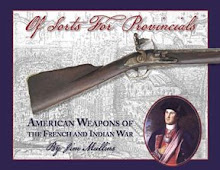As tensions mounted between the citizens of Virginia and Royal Governor Dunmore, the Governor dissolved the House of Burgesses which in turn allowed the standing Militia law authorization to lapse. In the wake of this, several volunteer "Independent companies" of extralegal uniformed militia were formed in various Virginia Counties. As one of Virginia's most experienced military leaders, Colonel George Washington led the Fairfax Independent company and was involved in procuring military style arms and accouterments for that and other Independent companies including that of Prince William County. In correspondence to Washington dated December 27, 1774 William Grayson requested that Washington
"... write to Philada. for forty muskets with bayonets, Cartouch boxes, or Pouches, and slings, to be made in such a manner, as you shall think proper to direct..."In a previous letter to Washington dated November 29, 1774, William Milnor writes:
The "Jersey Musquet" was most likely a New Jersey purchased Commercial Wilson musket of the type imported during the French and Indian War."...I have Applyed to two Gunsmiths, One palmer tells me he Can make one hundred by May next, And Nicholson says he can make the like Number by March, they both agree in the priece at £3.15. this Currcy.4 Palmer says Mr Cadvalder had agreed With him for 100 at that price, a Jersy Musquet was brought to palmer for a patern, Mr Shreive Hatter of Allexandira has one of that sort, which you may see..."
A Wilson commercial musket
A light musket with striking similarities to the Wilson muskets survives, signed by Thomas Palmer in the collections of the Museum of the American Revolution.
Pennsylvania Gazette Ad for Palmer ca. 1773
This Palmer marked musket has a convex side plate and distinctive "Wilson" style trigger guard, but differs from the Wilson pattern by mounting a flat commercial lock, and is cut for a bayonet.
Some of Washington's military equipment (Mount Vernon link)



